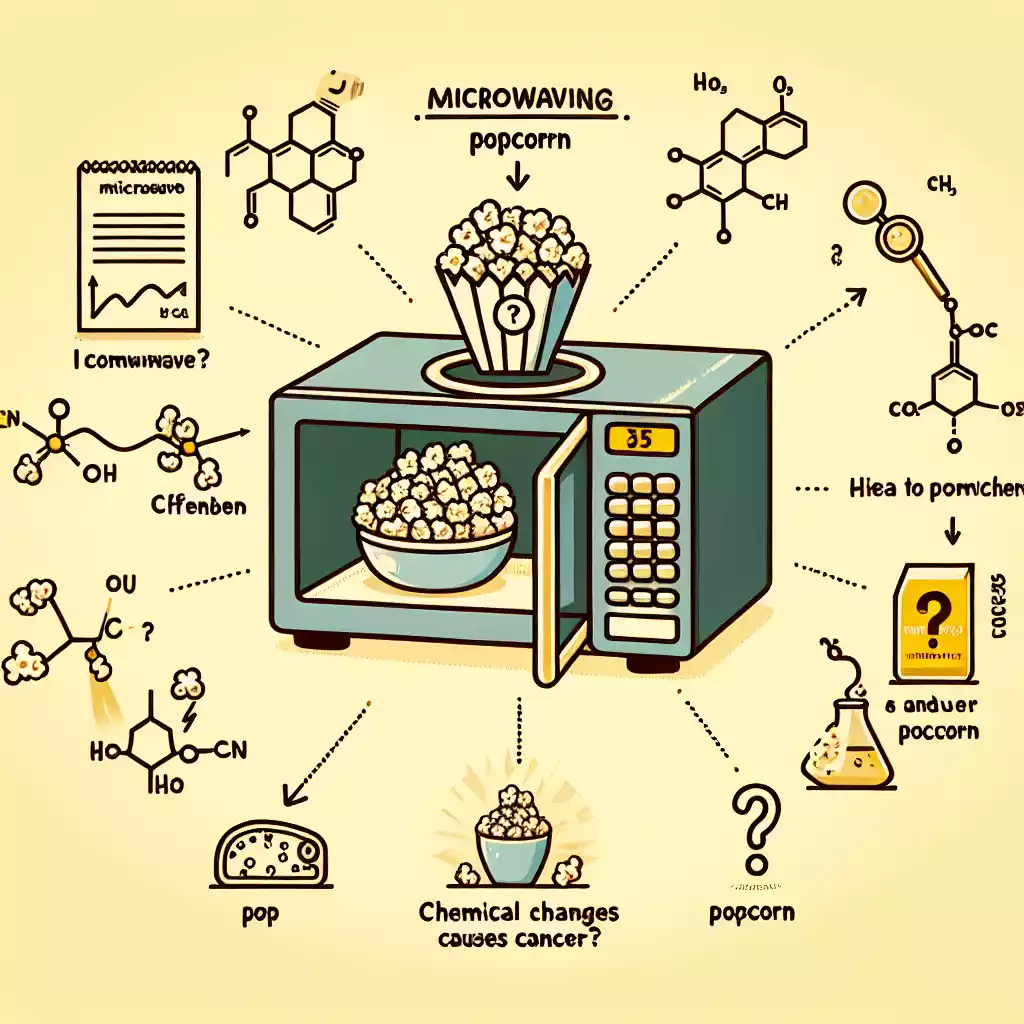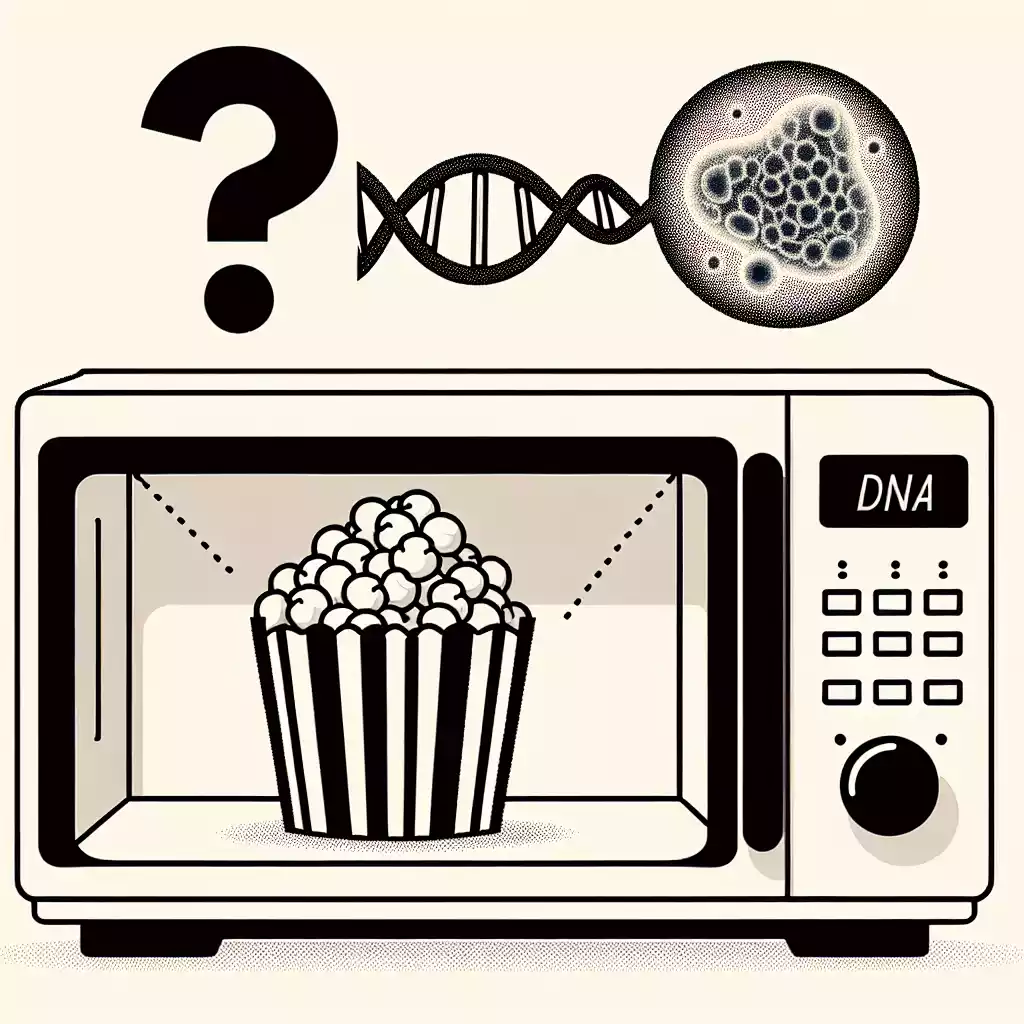Introduction
Popcorn has long been a favorite snack for movie nights and casual munching. The convenience of microwave popcorn has made it a household staple, but concerns about its safety have emerged over the years. The fear centers around whether the chemicals used in microwave popcorn can increase the risk of cancer. This article aims to explore these concerns by examining the ingredients, potential health risks, and scientific findings.
Microwave popcorn’s journey from a kernel to a fluffy treat involves more than just heat. The packaging and added flavorings are critical components. Chemicals like perfluorooctanoic acid (PFOA) in the packaging and diacetyl in the butter flavoring have raised eyebrows. These substances are suspected to pose health risks, including cancer. Understanding these elements is crucial for making informed choices about what we consume.
The debate isn’t just about popcorn but about the broader implications of food safety and chemical exposure. By delving into the ingredients, scientific studies, and safer alternatives, we can uncover the truth behind the claims and help you decide if microwave popcorn deserves a spot in your pantry.
Understanding Microwave Popcorn
Ingredients in Microwave Popcorn
Microwave popcorn contains several key ingredients:
• Popcorn Kernels: The primary ingredient.
• Oil: Often palm or soybean oil.
• Salt: For flavor.
• Artificial Flavorings: Commonly butter flavoring, which may contain diacetyl.
• Preservatives: Such as TBHQ (tert-Butylhydroquinone) to extend shelf life.
How Microwave Popcorn is Made
Microwave popcorn undergoes a specific manufacturing process:
• Packaging: Kernels are placed in a bag lined with PFOA to prevent grease from leaking.
• Flavoring: Butter flavoring is added, which may include diacetyl.
• Sealing: The bag is sealed to ensure freshness.
• Heating: Microwaving causes the kernels to pop due to the moisture inside them turning to steam.
Potential Health Risks

Chemicals in the Packaging
The packaging of microwave popcorn often contains PFOA, a chemical linked to various health issues:
• Cancer: Studies suggest a potential link between PFOA exposure and certain cancers, including kidney and testicular cancer.
• Other Health Issues: PFOA has been associated with thyroid disease, immune system effects, and developmental issues.
Artificial Flavorings
Diacetyl, used in butter flavoring, has been linked to respiratory problems:
• Popcorn Lung: Workers in popcorn factories developed bronchiolitis obliterans, a severe lung disease, due to diacetyl exposure.
• Consumer Risks: While the risk to consumers is lower, there are still concerns about inhaling diacetyl vapors when popping popcorn.
Scientific Studies and Findings
Studies on PFOA and Cancer
Research on PFOA has yielded concerning results:
• Animal Studies: PFOA has caused tumors in animal studies.
• Human Studies: Epidemiological studies have found associations between PFOA exposure and increased cancer risk, particularly kidney and testicular cancer.
Diacetyl and Respiratory Health
Diacetyl’s impact on respiratory health has been well-documented:
• Factory Workers: High levels of exposure led to severe lung damage in workers.
• Consumer Safety: Although consumer exposure is lower, some studies suggest potential risks, especially with frequent consumption.
Safer Alternatives
Air-Popped Popcorn
Air-popped popcorn is a healthier alternative:
• No Oil: Uses hot air instead of oil, reducing calorie and fat content.
• No Chemicals: Free from artificial flavorings and packaging chemicals.
Stove-Top Popcorn
Making popcorn on the stove is another safe option:
• Control Ingredients: You can choose healthier oils and avoid artificial additives.
• Better Flavor: Many find stove-top popcorn tastier and more satisfying.
Consumer Awareness
Reading Labels
Understanding ingredient labels is essential:
• Identify Chemicals: Look for PFOA and diacetyl on labels.
• Choose Wisely: Opt for brands that use natural ingredients and avoid harmful chemicals.
Choosing Healthier Brands
Some brands offer healthier microwave popcorn options:
• Organic Options: Brands like Quinn and Black Jewell use organic ingredients and avoid harmful chemicals.
• No Artificial Additives: Look for brands that prioritize natural flavorings and safe packaging.
Tips for Reducing Risks
Homemade Microwave Popcorn
Making your own microwave popcorn is easy and safer:
• Ingredients: Use plain kernels, a brown paper bag, and a bit of oil.
• Instructions: Place the kernels in the bag, fold the top, and microwave for 2-3 minutes.
Reducing Exposure to Harmful Chemicals
Practical tips for minimizing exposure:
• Ventilation: Ensure proper ventilation when popping popcorn.
• Limit Consumption: Enjoy microwave popcorn occasionally rather than daily.
• Store Properly: Store popcorn in a cool, dry place to maintain freshness without relying on preservatives.
Frequently Asked Questions
FAQ 1: Can microwave popcorn be part of a healthy diet?
Answer: Yes, in moderation. Choose brands without harmful chemicals and avoid consuming it daily.
FAQ 2: What are the signs of diacetyl exposure?
Answer: Symptoms include coughing, wheezing, and shortness of breath. If you experience these, consult a doctor.
FAQ 3: Are there any completely safe microwave popcorn options?
Answer: Some brands use safer ingredients and packaging. Look for organic and natural options.
FAQ 4: How does microwave popcorn compare to other snack foods?
Answer: Microwave popcorn can be healthier than chips or candy, especially if it’s low in salt and free from harmful additives.
FAQ 5: What should I do if I am concerned about the chemicals in microwave popcorn?
Answer: Consider alternatives like air-popped or stove-top popcorn, and choose brands that avoid harmful chemicals.
Conclusion
The concerns surrounding microwave popcorn and cancer stem from chemicals like PFOA and diacetyl found in the packaging and flavorings. While scientific studies suggest potential health risks, particularly with long-term exposure, there are safer alternatives available. By choosing healthier brands, making your own popcorn, and staying informed, you can enjoy this popular snack without unnecessary worry.

